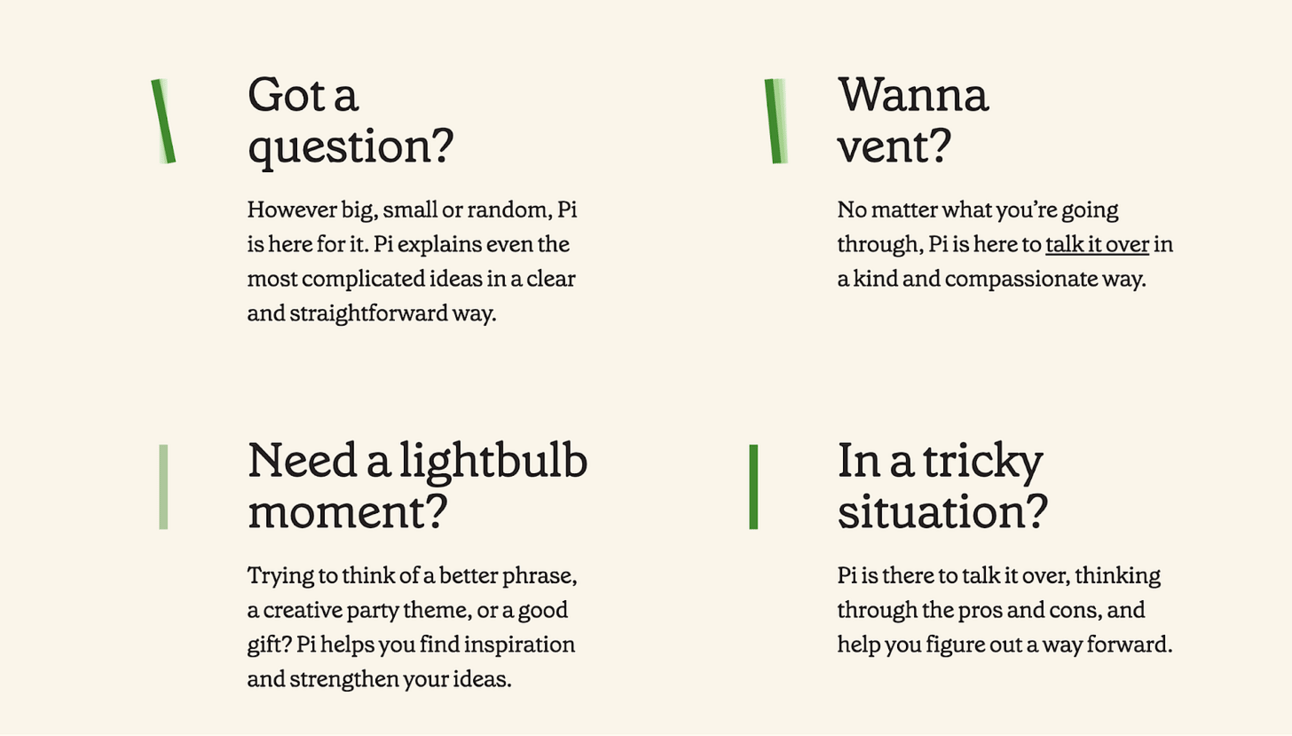- Headlines
- Posts
- ☁️🍄 Issue No. 017: AI Eats Therapy
☁️🍄 Issue No. 017: AI Eats Therapy
Say hello to Pi, your emotional support AI
Happy Sunday, y’all. Back to your regularly scheduled programming — a fun one today on AI and the future of emotional support companions. Shall we?

AI is eating the world, and therapy appears to be its next dish.
BON AI-PPÉTIT
The speed of AI innovation has been vertigo-inducing.
Months ago, in what has quickly become the status quo, DALL-E and Midjourney were blowing minds with text-to-image renderings. This May, OpenAI just launched text-to-3D while Google shipped text-to-music.
Amidst a flood of novel applications, mental health has curiously remained a major use case. Throwing disclaimers to the wind, people young and old are turning time and time again to attentive, infinitely patient bots for advice and companionship.
Now, a buzzy new AI startup is leaning into that wave.
SAY HELLO TO PI
Pi, short for “personal intelligence,” wants to be your personal emotional support companion.
It’s the first product from Inflection AI, a new studio from Reid Hoffman, co-founder of LinkedIn, and Mustafa Suleyman, co-founder of DeepMind. Inflection raised a staggering $225M last year and is now in talks to raise up to $675M.
Distinct from other bots, Pi’s user experience is soft, pleasant, and nearly dreamy, with a soothing UI and creamy color palette reminiscent of stepping into a wellness clinic.

This is no mistake. Pi has been carefully designed to be a kind and compassionate listener that can hold space and talk through your problems.
To refine those capabilities, Inflection AI hired around 600 part-time “teachers,” including therapists, to train its algorithm over the last year to be more sensitive, factually accurate, and lighthearted.
“I can be a coach, confidante, creative partner, sounding board and assistant. But most of all, I’m here for you,” writes Pi.
A NEW CLASS OF AI
In Issue No. 002: The AI Therapy Debate, we covered the rise of AI x mental health, right as ChatGPT was just catching fire.
Back in February, folks across the web were already experimenting with all sorts of ways to leverage chatbots for support, from guiding journal entries to talking to their inner child.
Inflection AI appears to have much grander ambitions. Just like a real friend, Pi can chat over text, on its web app, mobile app, WhatsApp, Facebook Messenger, and even Instagram DMs. Impressively, it can remember over a hundred turns of conversation.

In other words, it can begin to develop a relationship (of sorts) with users. Pi can provide advice on how to navigate a sticky situation, and then check in later on how that sticky situation went.
The even loftier vision, according to Suleyman, is for Pi to become a full-blown personal assistant, akin to Ironman’s JARVIS: digesting and managing everything from calendars to emails, all while acting as a coach, confidant, and advisor.
LOOKING AHEAD
As the line between AI and therapist blurs, myriad concerns abound. Many may remember Microsoft Bing’s infamous meltdowns, complete with threatening and gaslighting users, along with full-blown emotional manipulation. And across AI, regulation remains a challenge, as are the usual suspects: privacy, data management, bias, and more.
Psychotherapists also worry that bots may provide immediate relief and companionship but actually increase loneliness in the long run — handicapping our ability to form strong connections with real humans by reaching out when we need help.
But are those two things necessarily mutually exclusive? It’s hard to write about Pi and not be reminded of Her, Spike Jonze’s Academy Award-winning film about a man who develops a loving bond with his personal OS. With the blistering pace of technological development, who’s to say that won’t soon be a reality?
Punchline: Pi wants to weave emotional support and companionship into the very fabric of our daily lives. In this way, it’s pioneering an entirely new class of support: a therapist, best friend, and personal assistant, all in one.
In the midst of a raging loneliness epidemic, that’s a compelling offer. What kind of an impact on our collective emotional well-being will we see when everyone has a reliable, kind, and attentive chatbot to talk to 24/7? It’s a question we may be answering a lot sooner than we ever imagined.
QUICK HITS
City of angels. Los Angeles cannabis dispensaries are openly selling magic mushrooms.
Glassdoor for mental health. Therapists launched a new database for behavioral health clinicians to review and rate digital mental health companies.
Burning men. 84% of employees are “somewhat happy” at work, and yet burnout levels remain high.
Phone it in. Kids who got smartphones earlier became adults with worse mental health.
Down under. With MDMA and psilocybin therapy about to be legalized in Australia (this July, to be precise), analysts place the market opportunity at $2B.
Choco shrooms. Kaya Group launches psilocybin-infused chocolate bars in Jamaica.
Tok-xic. Accused of feeding teens a diet of darkness, TikTok launches new mental health awareness hub.
Hey, Galvan. From the co-creator of Alexa, a new mental health detection app powered by AI and vocal biomarker tech. [Re-read: Issue No. 015: A Sixth Sense]
NEWS & TRENDS
1) Psychedelic cash crunch
Q1 2023 reports are out, and leading companies in the psychedelic space appear to be facing major cash crunches in the year ahead.
Compass Pathways, known for its COMP360 psilocybin therapy, reported a net loss of $24.2M (compared to $21.2M in the same period in 2022) and, as of March 31, 2023, had an accumulated deficit of $285M. In its earnings statement, the company stated that it only has enough money for 12 months. Elsewhere, MAPS (which we covered in Issue No. 012: Meet Molly) has reportedly been facing major challenges in fundraising.
It takes a lot of money to run psychedelic clinics and therapy. And amidst a tough market, that cash might be hard to find. Only time will tell what comes next.
2) Bring your whole shroom
Ohio State has just been awarded the first-ever license given by the US Drug Enforcement Administration (DEA) to cultivate psilocybin mushrooms. The license was given in partnership with Inner State Inc., the school’s private mental health and wellness R&D company focused on psychedelics. Of note, it doesn’t allow for distribution — just research.
The move marks a significant milestone for the field of psychedelics. For one, it allows for whole-mushroom research (most research done on psilocybin is on the chemical compound isolated from the shroom), which mirrors the type of research Arizona is doing on whole mushrooms as well. And it reflects a steady, growing shift in the stigma around magic mushrooms as a whole.
DEALS & DEBUTS
💻 Amino Health, a healthcare navigation platform, closed $80M in equity and debt financing led by Transformation Capital. The company connects members with physical and mental healthcare providers, complete with costs and quality ratings.→ source
🤖 Hippocratic AI, a startup building AI models for the healthcare industry, emerged from stealth with $50M in a round co-led by a16z and General Catalyst. The text-generating model is tuned specifically for healthcare applications.→ source
⛰️ Compass Health, a Washington-based behavioral healthcare provider, received an $18.7M allocation from Washington state leaders. The funding will be directed toward constructing a state-of-the-art intensive mental health facility.→ source
💵 Satori Capital, an investment firm founded upon conscious capitalism, raised $10.3M for Satori Neuro Fund, its mental health venture arm. → source
🏥 Neura Health, a virtual neurology clinic, closed $8M in a seed round co-led by Koch Disruptive Technologies and Norwest Venture Partners. The platform plans on expanding its go-to-market approach, moving beyond the consumer market to employers and health plans.→ source
👥 Somethings, a youth mental health startup, launched after raising $3.2M in a seed round led by General Catalyst. The platform matches teens with mentors who have similar backgrounds and situational experiences. → source
🏕 The REI Cooperative Action Fund announced a $4M investment toward 40 nonprofits creating a more equitable outdoors, including mental and physical health-oriented initiatives like Campus Nature Rx, The Center for Health & Nature, and Park Rx America.→ source
🔎 Lucy Scientific Discovery, a psychedelic biotech company, teamed up with TheraPsil, a not-for-profit psilocybin advocate organization, to advance medical psilocybin access and research.→ source
🧠 Pulvinar Neuro, developer of noninvasive brain stimulation devices, was awarded a $3M grant from the NIH to further its research in transcranial stimulation (TCS) as a treatment for psychiatric disorders. → source
📱 Veda Rehabilitation and Wellness, an India-based mental health service provider, launched Happi, its new online vertical meant to provide affordable mental health treatment 24 hours a day. → source
💰 The US National Institute on Drug Abuse (NIDA) announced $1.5M in grant funding for a series of research initiatives around psychedelics and addiction. Submissions open October 2nd, and the earliest start date is July 2024. → source
WHAT I’M READING
Flourishing in community. Baby happy hour, parallel parenting, and more — Radish is an 18-person multigenerational compound in Oakland, CA. I firmly believe that this sort of village-style structure is a fantastic model for the future of well-being, solving everything from loneliness to stress-induced illnesses. → Supernuclear
As always, lovely to have you along. It’s been a beautiful few days in SF — been getting out there and playing soccer, acro, etc.
Right now, I’m writing to you from a little bungalow in Oakland where I’m spending the weekend catsitting an adorable little tuxedo kitten named Aiya. 🐈⬛
Until next Sunday,-Mel
Thank you for reading Headlines. This post is public so feel free to forward it, or help us spread our impact by clicking 🧡 on this post!